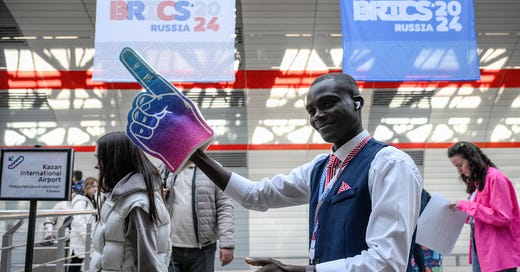Quite the contrast: BRICS opens doors and the US closes them
As BRICS nations unite to foster global cooperation and economic growth, the US retreats, closing doors with strict policies and diplomatic tensions. A tale of two approaches shaping our world.
One of America's longest-standing traditions is that it welcomes all. Chances are most US students can quickly recite the words they were taught in school that appear at the base of the Statue of Liberty: "Give me your tired, your poor, your huddled masses yearning to breathe free."
Let's set aside that people from every geographical location that have immigrated to the US have faced hostility; whether from Europe, Asia, Latin America, Africa or the Middle East, those "huddled masses" faced racism and more as they sought to establish a life in America.
Yet, the myth that they would find open doors and the corresponding open hand of friendship sustained them. Does such a myth endure? In other words, has the open hand of friendship been replaced with the closed fist of fury?
Before we answer, let's look at BRICS, something that began with enthusiasm and grit when it launched roughly 20 years ago, and how it's become a powerhouse on the global stage. Brazil, Russia, India, China, and South Africa are now joined by five other full-member states and eight partner nations, all contributing to BRICS' mission of increasing the organization's international stature, aligning economic strategy, and decreasing reliance on the US-dominated finance system.
The message is resonating: BRICS is the movement of the future. While the G7 remains unwilling to expand, BRICS repeatedly does; for example, Indonesia became a full member at the beginning of this year. It now represents almost half the world's population and more than 40 percent of the world's GDP. And through global efforts such as the Belt and Road Initiative, which began in 2013, more and more nations are partnering with each other and BRICS countries in development and trade.
In examining the 2024 BRICS summit in Russia, I noted it had "provided another example of what can happen when world leaders come together to seek positive change. They understand that defending their nations' particular interests doesn't automatically mean confronting those nations that might espouse different goals." That theme of mutual respect is certain to continue throughout 2025. This year, Brazil serves as president, a role that includes hosting the summit, scheduled for July.
Suffice to say, the US doesn't agree with BRICS' welcoming and positive philosophy. As one example, Secretary of State Marco Rubio announced a few days ago that South Africa's ambassador was expelled from the US and would need to leave the country by the end of the week. According to Rubio, Ebrahim Rasool is "a race-baiting politician" who hates America and President Donald Trump. Perhaps the problem is not in Pretoria but in Washington. Since Trump returned to the White House, he has repeatedly criticized South Africa for promoting what he considers an anti-White agenda. Moreover, about 15 months ago, South Africa also drew the ire of the US by prosecuting Israel at the International Court of Justice for genocide crimes based on what has unfolded in Gaza.
Trump's disdain for South Africa is obvious, and Rubio defiance of diplomatic protocol is, as well.
We also know that Trump remains committed to a strident immigration policy. There's nothing wrong with a nation announcing that it needs to limit the amount of people it allows in from other countries; common sense must guide any immigration plan. But it's quite another for a world leader to inhumanely define immigrants as Trump has. The president has turned "give me your tired, your poor, your huddle masses" into "don't give me your drug dealers, your AIDS carriers, your rapists." Thus, the stereotyped image of the small child, eyes big with wonder and fear, coming to the US has been replaced with the image of an angry Hispanic or Black man eager to corrupt the US from within.
Trump has also lashed out at BRICS, picking up on what he might call "fake news" by claiming the organization wants to create its own currency. It is not, yet Trump boasted that he would levy "a 100 percent tariff" before insisting "BRICS is dead." ThinkBrics has clearly articulated why any currency idea is useless. Rather, a common payment system has been examined. Distinguished economist Dr. Vidhu Shekhar told ThinkBrics such an idea is merited because it would allow BRICS members to conduct trade while using domestic currencies.
Who cares? You ask. The point is not whether BRICS is seeking to further anger an already angry US president, but rather it is thinking openly about how to make itself less beholden to the West.
We're left with a clear reality as March 2025 begins to wind down: BRICS is gaining in confidence that it can be a positive actor on the global stage as the US recoils from international commitments. BRICS is fostering goodwill among its full- and partner-member states as the US affirms tariffs against countries big and small, friend or foe. BRICS is exploring how to best engage with the future as the US seeks comfort in ideas from days gone by.








TRUE
BRICS member South Africa made a deal with the EU to participate in EU's version of the Belt and Road Initiative, the Global Gateway. In other words BRICS member South Africa plays both sides, yet this site and promoters of BRICS always try to give the impression that South Africa is fully on the side of BRICS and in opposition to the West, that South Africa wants to "break away" from the colonial hold of the West, etc. This is simply not true. Look at the facts and South Africa's trade and investment deals with the West.
"The European Union (EU) and South Africa have announced a €4.7-billion (R94-billion) package of new investments in South Africa, mainly for the transition to clean energy and for boosting vaccine manufacturing.
The “Global Gateway Investment Package” was announced at the 8th SA-EU summit, in Cape Town on Thursday. It will comprise €303-million in grants from the EU and its members and loans from the European financial institutions and SA’s development banks to leverage a further €4.4-billion in investments.
Ursula von der Leyen, the president of the EU Commission, who headed the EU delegation along with EU Council President António Costa, announced the programme. She said there was already almost €50-billion in annual trade between SA and the EU, and 98% of SA exports to the EU were duty- and quota- free."
[13 March, 2025: EU and SA announce R94bn package for new investments in clean energy, vaccine manufacturing]
http://archive.today/6tdBv